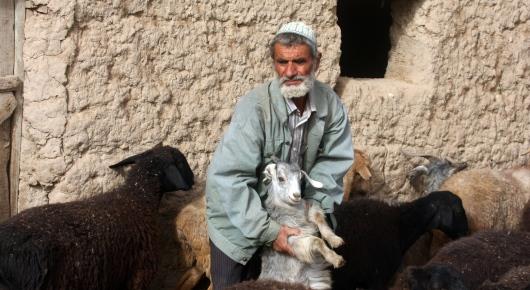Meeting: Science diplomacy can improve regional peace while fighting animal disease

Cooperation on scientific issues related to animal diseases is one path towards increased regional peace. Happy, healthy societies with reliable and nourishing sources of food are less likely to turn towards crime or extremism, and ensuring stable livelihoods for smallholder farmers stabilizes a society by providing them with decent work and income.
That was one of the themes repeated often during a meeting late last month of government officials and animal experts from throughout Central, Southern and Western Asia.
“This isn’t just about science, and this isn’t just about food security,” one participant noted. “This is about peace-building.”
The second multilateral meeting on transboundary animal diseases in the Central, Southern, and Western Asia regions took place 27–28 June in Istanbul, Turkey. Chief veterinary officers and other animal experts from the governments of Afghanistan, the Islamic Republic of Iran, Pakistan, Tajikistan and Uzbekistan met as part of an ongoing series of regional meetings on animal health issues, all funded by the Government of Japan. The meeting was organized by the FAO Representation in Afghanistan.
Animal health problems have a wide range of effects, from environmental to social, said Tomio Shichiri, FAO Representative in Afghanistan, at the meeting.
“Livestock health isn’t just about health; it’s about all of our economies,” he said. “Livestock trade is very valuable to our nations and has the potential to be a major contributor to GDP as human populations grow and as we continue to develop the livestock industry in a sustainable, climate-friendly manner.”
Delegates from each of the five nations spent much of the meeting in working groups themed around epidemiology, quarantine, and laboratories. In these groups, government staff from neighboring countries worked face-to-face with each other to find solutions to challenges related to transboundary animal diseases (TADs). Challenges include issues such as poor-quality vaccines, insufficient resources for mass-vaccination campaigns, nonexistent expiration dates on imported animal products, meagre national budgets for animal health, and illegal animal trade across remote national borders. While the issues at times were contentious, the delegates were largely able to propose solutions agreeable to all of the parties.
For example, while all countries have their strengths and weaknesses, the Islamic Republic of Iran generally has the most capacity around laboratory issues and therefore offered to serve as the regional reference laboratory and training center for laboratory staff. Likewise, Afghanistan offered to share its case definitions for priority diseases, and Uzbekistan offered to train everyone on establishing and running quarantine stations.
Topics receiving the most attention included the cross-border movement of animals and regional information sharing. While acknowledging that it’s difficult to control animal movement in remote, mountainous border zones regularly traversed by nomadic herders, delegates proposed developing bilateral standard operating procedures for cross-border movement.
Regarding the sharing of information, attendees agreed that FAO Afghanistan would set up a secretariat for regional TAD coordination. Through this secretariat, animal experts from each of the five countries would share information, develop joint work programmes, and plan future regional meetings. Attendees also agreed that a concept note for an expanded programme on combatting TADs would be produced and circulated among the attending countries for their comments and later submission to funding bodies.
Citing the “One World, One Health” approach to addressing health threats, Edris Raouf, head of the delegation from Afghanistan, noted the importance of regional collaboration.
“These diseases know no boundaries,” he said, “and therefore strong cooperation across our human-drawn international boundaries is the only path to eradicating these diseases regionally.”
17 July 2018, Istanbul, Turkey
